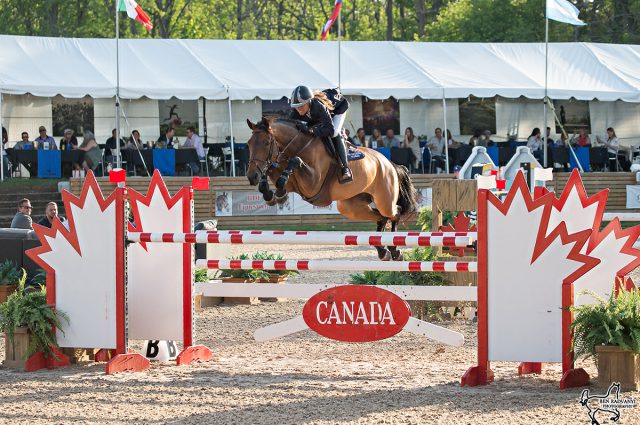Kim Farlinger on Confidence after a Fall and the Perfect Young Horse

Kim Farlinger is an Canadian Grand Prix rider based out of Orangeville, ON with more achievements under her belt than she can count. From her first international win at age 19 at North American Young Rider Championship in 2003 to consecutive wins in the Molson Canadian Three Star and Scotia Cup at Spruce Meadows. She has won the HITS $25,000 Grand Prix in Thermal, California and this winter, she won the $100,000 Sullivan GMC Truck Grand Prix at HITS Ocala. Fresh off her win in the $25,000 FEI Grand Prix at Angelstone Tournaments CSI*, we sat down with Kim to get the details on her top mount Charming Force B, her idea of the perfect young horse, and how her career has progressed since the injury that changed everything for her last winter at WEF.
HDM: Just over a year ago, you suffered a bad fall at WEF and broke your leg. What happened?
KF: I did a tibial plateau fracture and ACL avulsion fracture which is pretty serious. I had to have surgery and I was in the hospital for about 10 days. It was a pretty tragic event for me in a lot of ways, I was off riding for about 3 months and it was a lot of rehab and a lot of physio to get strong enough to walk and ride again. It probably took a year in total for me to get back to riding as well as I was before the injury but at this point now it doesn’t affect me day to day anymore.
What was it like to get back on a horse after that?
At the very beginning, it was kind of just nice to be back on a horse and it felt good to be back in the saddle. Then by the time I was actually going to start jumping and showing again it was a little bit… I don’t want to say nerve-wracking but certainly that there wasn’t as much confidence in my leg being able to actually do its job. If the horses were naughty or bucked or anything, I didn’t feel like I was very secure so there was certainly an emotional struggle in getting my confidence back to be able to rely on my leg to work properly once I got going, but that that went away relatively quickly. I’d say that that only lasted probably 3 months after I started riding again. Then it was just working on the strength and the flexibility of my knee after that.
Was there anything that you worked on specifically that helped the mental aspect of coming back from your injury?
Not really. Probably there could’ve been, but I think that time and riding more horses and showing and just knowing that it was starting to work better and that I wasn’t going to fall off every day. As I got more rounds and jumped more classes it just sort of subsided. I don’t really have a confidence issue when I ride as far as being really nervous or being worried so I think for me it went away relatively quickly because I don’t naturally struggle with that.
You’re back on the top of your game with major Grand Prix wins on Charming Force B. What is your training philosophy for this mare?
*Laughs* I try and have only enough control that I can tell her which jumps to go to and I kind of leave the rest up to her. She’s a bit of a difficult personality and she’s not that rideable and not that trainable but she’s very talented so I’ve sort of figured out over the last 6 months with her that if I can get enough control and have her listen well enough, then she still feels happy enough and not like I’m being mean to her. She seems to perform better that way. She had a big win in Ocala [over the winter] and I think that was a big turning point for her because she started to understand the difference between winning and losing. She sort of goes in the ring every time now thinking she wants to win and will make the extra effort. But I don’t know that I really have a training philosophy as such with her.
What are the main things that you look for in purchasing a young horse for yourself?
I mean obviously talent, and that they have the natural ability and scope and carefulness and technique. But I think temperament plays a big role. They need to be brave, they need to be willing, and they need to be tough. Our shows now especially, in these bigger Grand Prix’s, there’s a lot of atmosphere and there are big crowds and it’s quite loud and if you have something that’s really sensitive or really spooky, it’s already difficult before you even try to jump around the course. So I think if you can find a horse with a really good temperament than that can make up for a lot.
What is one thing that you learned early on in your career that has stuck with you?
Oh that’s a tough one. I think the hardest thing in our sport is that there are more downs than there are ups and you have to be as comfortable with losing as you are with winning. So I think that to take each class as just a class and not dwell on your mistakes, but also not to spend too much time thinking about your victories either and get too overconfident. You just ride each class for what is and if it’s good, you celebrate. If it’s bad, you just let it go. It’s difficult for people to overcome when they feel like they’re in a bit of a rut and not riding very well. So I guess the biggest thing is that you don’t give up and you ride to win each class and not worry about the details too much. It is a sport at the end of the day, and that’s it.

